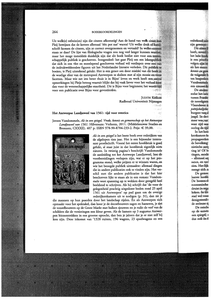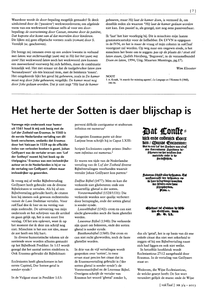Binnen de kamers van retorica namen de refereinen een aparte plaats in. Goede refereinen waren gebonden aan strikte regels en werden op de juiste manier voorgedragen op festivals waar de beste refereinen werden bekroond met een prijs. In dit artikel worden de drie prijswinnenende refereinen van het Rotterdamse rhetorijcfeest van 1561 onder de loep genomen.
DOCUMENT

Recensie van het proefschrift van Jeroen Vandommele: 'Als in een spiegel'.
DOCUMENT

Background: A higher protein intake is suggested to preserve muscle mass during aging and may therefore reduce the risk of sarcopenia.Objectives: We explored whether the amount and type (animal or vegetable) of protein intake were associated with 5-y change in mid-thigh muscle cross-sectional area (CSA) in older adults (n = 1561).Methods: Protein intake was assessed at year 2 by a Block foodfrequency questionnaire in participants (aged 70–79 y) of the Health, Aging, and Body Composition (Health ABC) Study, a prospective cohort study. At year 1 and year 6 mid-thigh muscle CSA in square centimeters was measured by computed tomography. Multiple linearregression analysis was used to examine the association between energy-adjusted protein residuals in grams per day (total, animal, and vegetable protein) and muscle CSA at year 6, adjusted for muscle CSA at year 1 and potential confounders including prevalent health conditions, physical activity, and 5-y change in fat mass.Results: Mean (95% CI) protein intake was 0.90 (0.88, 0.92) g ·kg–1 · d–1 and mean (95% CI) 5-y change in muscle CSA was −9.8 (−10.6, −8.9) cm2. No association was observed between energyadjusted total (β = −0.00; 95% CI: −0.06, 0.06 cm2; P = 0.982), animal (β = −0.00; 95% CI: −0.06, 0.05 cm2; P = 0.923), or plant(β = +0.07; 95% CI: −0.06, 0.21 cm2; P = 0.276) protein intake and muscle CSA at year 6, adjusted for baseline mid-thigh muscle CSA and potential confounders.Conclusions: This study suggests that a higher total, animal, or vegetable protein intake is not associated with 5-y change in midthigh muscle CSA in older adults. This conclusion contradicts some, but not all, previous research. This trial was registered at www.trialregister.nl as NTR6930.
DOCUMENT

De eerste Nederlandse vertaling van 'Laus Stultitiae' van Erasmus verscheen in 1561. De vertaler heeft gebruik gemaakt van de Leuvense Bijbel voor de vertalen van de Bijbelcitaten.
DOCUMENT

Fintechs worden steeds belangrijker voor de financiering vanhet midden- en kleinbedrijf. Naast nieuwe kansen brengen hunnieuwe verdienmodellen ook nieuwe risico’s met zich mee. Hoekunnen toezichthouders hier verstandig mee omgaan?IN HET KORT●Al te snel ingrijpen smoort innovatie, maar laisser-faire kan viaincidenten het vertrouwen in de financiële sector schaden.●Toezichthouders en de Stichting MKB Financiering kiezen nugelukkig voor intensieve monitoring samen met zelfregulering.
MULTIFILE
PowerPointpresentatie gebruikt bij een presentatie van Hans Hopster, lector Diergedrag, Diergezondheid en Dierenwelzijn, op 3 maart 2020 aan de Provinciale Staten van Friesland te Leeuwarden.
MULTIFILE

Multiple organizations around the world have issued evidence-based exercise guidance for patients with cancer and cancer survivors. Recently, the American College of Sports Medicine has updated its exercise guidance for cancer prevention as well as for the prevention and treatment of a variety of cancer health-related outcomes (eg, fatigue, anxiety, depression, function, and quality of life). Despite these guidelines, the majority of people living with and beyond cancer are not regularly physically active. Among the reasons for this is a lack of clarity on the part of those who work in oncology clinical settings of their role in assessing, advising, and referring patients to exercise. The authors propose using the American College of Sports Medicine's Exercise Is Medicine initiative to address this practice gap. The simple proposal is for clinicians to assess, advise, and refer patients to either home-based or community-based exercise or for further evaluation and intervention in outpatient rehabilitation. To do this will require care coordination with appropriate professionals as well as change in the behaviors of clinicians, patients, and those who deliver the rehabilitation and exercise programming. Behavior change is one of many challenges to enacting the proposed practice changes. Other implementation challenges include capacity for triage and referral, the need for a program registry, costs and compensation, and workforce development. In conclusion, there is a call to action for key stakeholders to create the infrastructure and cultural adaptations needed so that all people living with and beyond cancer can be as active as is possible for them.
DOCUMENT

The Dutch research project “Wijs met techniek” (Tech-Wise) explores ethics education from a tool-based, practical perspective. Especially if and how practical tools for ethical deliberation on the impact of technology can be helpful in ethics education for engineering students. The approach is first intended as a variation on theories in ethics and technology. Secondly, the approach uses a focus on the impact of technology as a way toward ethical deliberation. Both characteristics are intended to better appeal to engineering students. In the project we cover three levels of higher education: a University, a University of Applied Sciences and a School for Vocational Training. Together we are developing and testing a suite of activating working methods that can be tailored to various engineering programmes. A first result of this is the simple workshop format “ethics for engineers”, consisting of five steps with four effective ingredients. In this paper we present the general format of this workshop and dive in particular into a specific instance of the workshop called “Wonderberries”. The experiences from the workshop show that with a carefully chosen combination of engaging orientation, a specific ‘technology’ and a concrete design exercise the ethical questions and subsequent deliberation and reflection can be very rich.
MULTIFILE

In deze studie wordt nagegaan of het energieverbruik van de stad Groningen in 2035 voor elektriciteit en warmte volledig verduurzaamd kan worden door middel van wind, zon of biomassa. Tevens wordt nagegaan wat dit zou betekenen voor de omgeving en wat het kost. De randvoorwaarde is dat de stad Groningen in 2035 volledig zelfvoorzienend is. Het energieverbruik dat noodzakelijk is voor mobiliteit (benzine en diesel) is in deze studie niet meegenomen.Er worden drie scenario’s bestudeerd. Twee all-electric scenario’ s waarbij duurzame energieopwekking gebeurt door windturbines of zonnepanelen en aan de warmtevraag wordt voldaan via warmtepompen. Daarnaast een scenario met biomassa/biogas waarbij de benodigde elektriciteit wordt opgewekt in warmtekracht installaties. Uitgangspunt van de studie zijn gerealiseerde tijdafhankelijke gegevens voor de stad Groningen over 2012. Er wordt uitgegaan van de huidige stand van de techniek. De lezer wordt uitgedaagd op basis van eigen inzichten de gevolgen van technologische vooruitgang in de resultaten te verwerken.
DOCUMENT

Businesses that can develop an appropriate response to the turbulence created by change and diversified customer expectations retain their sustainable competitive advantage. Especially with Covid19, Digital Transformation has emerged as an important element of pressure and necessity on the competitive advantage of businesses. Digital transformation refers to a radical change process from the way of doing business in the industry and the market to the nature of the interaction with internal and external customers. Digital transformation allows for meeting new expectations with new business processes and customer experiences with the opportunities offered by digital technologies. Although Digital transformation offers important competencies for businesses, it seems that SMEs, especially as important actors in the economy, lag behind large enterprises in the digital transformation process. This situation necessitates a detailed consideration of SMEs in the digital transformation process. This study aims to examine Digital Transformation in SMEs in detail. To achieve this, studies investigating digital transformation in SMEs and presenting empirical results were identified from various indexes (Ulakbim, Scopus, Web of Science, and Proquest). The studies were classified according to "author," "date of publication," "type of research," "sample," and "variables." The empirical evidence regarding the digital transformation process of SMEs is presented. The findings of the study are expected to contribute to the literature by presenting empirical studies on Digital Transformation in SMEs comprehensively. Additionally, it will increase awareness of the findings regarding the digital transformation process of SMEs, which are important actors in the economy.
MULTIFILE